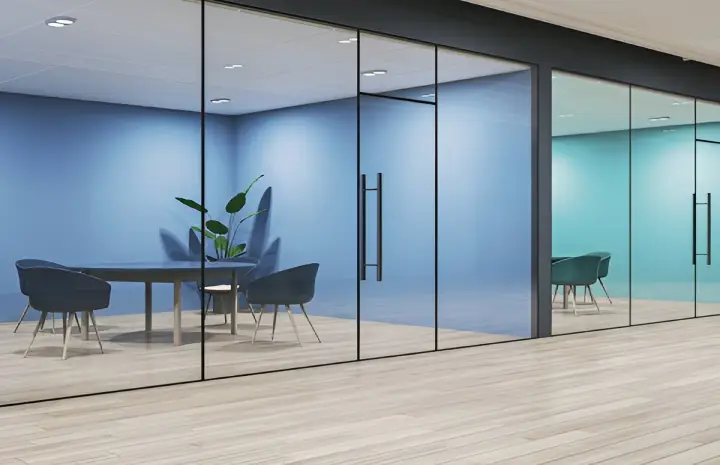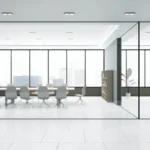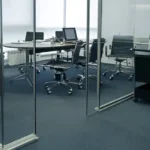From Static Walls to Folding Glass – A 2025 Office Trend
Office design has undergone a dramatic transformation in recent years. What was once dominated by static walls and rigid layouts has now shifted toward flexibility, openness, and light. In 2025, one of the most significant interior design innovations leading this change is the use of Folding Glass Walls.
These modern partitions are no longer seen as luxury features; they have become practical necessities for businesses that want to maximize efficiency and reflect contemporary design values. In this blog, we’ll explore why folding glass walls are replacing static walls, the benefits they bring to workplaces, and how they define the future of office interiors.
Why Offices Are Moving Away from Static Walls
For decades, static walls were the norm in offices. They divided spaces permanently, provided privacy, and supported structural needs. However, as businesses evolved, so did workplace expectations.
- Lack of Flexibility: Static walls create rigid layouts that cannot adapt to new work models.
- Reduced Light Flow: Solid partitions block natural light, creating dark, uninspiring environments.
- Wasted Space: Traditional walls take up valuable square meters, especially in premium office real estate.
- High Renovation Costs: Modifying layouts often requires major construction work.
In contrast, Folding Glass Walls solve these issues by offering adaptable, stylish, and functional solutions.
What Are Folding Glass Walls?
Folding Glass Walls are modular systems made of glazed glass panels connected through folding mechanisms. They can open, close, or stack neatly to transform a space instantly.
Key features include:
- Transparency: Maximizes natural light while maintaining visibility.
- Flexibility: Panels can fold away to create open areas or close to form private spaces.
- Customization: Available in clear, frosted, tinted, or smart glass options.
- Durability: Designed with toughened glass and robust aluminum or steel frames.
Why Folding Glass Walls Are a 2025 Trend
1. Adaptability for Hybrid Work
Hybrid work models require spaces that shift easily between collaborative zones and private offices. Folding glass walls provide instant adaptability, making them ideal for modern work environments.
2. Light-Filled Workplaces
Natural light is a top design priority in 2025. Folding glass walls ensure sunlight reaches across the office, creating healthier and more productive environments.
3. Minimalist and Modern Aesthetics
With their sleek lines and contemporary finishes, folding glass systems fit seamlessly into both luxury offices and minimalist interiors. They’re more than partitions — they’re design statements.
4. Space Optimization
Static walls often make offices feel smaller and cramped. Folding glass partitions fold neatly, maximizing usable space and making layouts more efficient.
5. Sustainability and Energy Savings
By reducing reliance on artificial lighting and using eco-friendly materials, folding glass systems align with green building initiatives.
Benefits of Folding Glass Walls
- Flexibility: Easily reconfigure spaces for meetings, events, or daily work.
- Privacy Options: Use frosted or smart glass for confidential areas.
- Cost Efficiency: Avoid expensive renovations by using modular solutions.
- Durability: Toughened glass ensures long-term performance.
- Impressions: Modern offices with glass walls impress clients and visitors instantly.
Design Applications of Folding Glass Walls
1. Meeting Rooms
Create private, acoustic-friendly spaces that can open up for larger gatherings.
2. Executive Cabins
Offer leaders privacy while maintaining visibility and connection with the team.
3. Reception Areas
Impress visitors with stylish glass walls that blend openness with professionalism.
4. Collaborative Spaces
Encourage teamwork by defining zones with transparent partitions that don’t feel restrictive.
5. Event Halls
Convert large halls into smaller rooms or expand compact areas into event-ready spaces instantly.
Folding Glass Walls vs Static Walls
| Feature | Folding Glass Walls | Static Walls |
|---|---|---|
| Flexibility | Adaptable, open or closed | Fixed, unchangeable |
| Light Flow | Maximizes sunlight | Blocks natural light |
| Aesthetic Appeal | Modern, sleek, luxurious | Plain and rigid |
| Space Efficiency | Panels fold neatly | Occupy permanent space |
| Privacy Options | Smart, frosted, or tinted | Opaque only |
This comparison makes it clear why folding glass is the preferred choice in 2025.
Why Folding Glass Walls Are Popular in Cities Like Abu Dhabi and Dubai
In fast-growing business hubs, premium real estate demands smarter space solutions. Folding Glass Walls are popular in places like Abu Dhabi and Dubai because they:
- Reflect modern luxury and innovation.
- Support hybrid work environments.
- Maximize natural light in high-rise buildings.
- Enhance brand image with sophisticated interiors.
The Future of Folding Glass Walls
The popularity of folding glass systems will only grow, with new innovations emerging:
- Smart Glass Technology: Switch from clear to opaque instantly.
- Interactive Surfaces: Walls that double as whiteboards or digital displays.
- Eco-Friendly Materials: Sustainable glazing and recycled frames.
- Automation: Motorized systems for effortless opening and closing.
These advancements ensure that folding glass will remain at the core of office design in the years ahead.
Conclusion
The shift from static walls to Folding Glass Walls reflects a larger cultural change in how businesses think about workspaces. Offices in 2025 prioritize flexibility, natural light, modern aesthetics, and sustainable practices — and folding glass walls deliver on all fronts.
For companies looking to future-proof their offices, folding glass isn’t just a stylish upgrade; it’s a strategic investment in productivity, employee wellbeing, and brand image.




